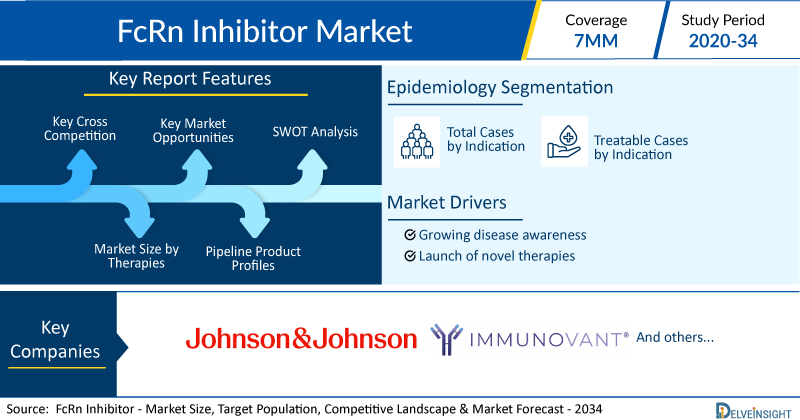FcRn Inhibitor Market is Predicted to Grow Rapidly During the Study Period (2020–2034) | DelveInsight
The dynamics of the FcRn inhibitors market are anticipated to change in the coming years due to the improvement in the diagnosis methodologies, raising awareness of the diseases, incremental healthcare spending across the world, and the launch of emerging therapies during the forecast period of 2024–2034.
New York, USA, April 16, 2024 (GLOBE NEWSWIRE) — FcRn Inhibitor Market is Predicted to Grow Rapidly During the Study Period (2020–2034) | DelveInsight
The dynamics of the FcRn inhibitors market are anticipated to change in the coming years due to the improvement in the diagnosis methodologies, raising awareness of the diseases, incremental healthcare spending across the world, and the launch of emerging therapies during the forecast period of 2024–2034.
DelveInsight’s FcRn Inhibitor Market Insights report includes a comprehensive understanding of current treatment practices, emerging FcRn inhibitors, market share of individual therapies, and current and forecasted FcRn Inhibitor market size from 2020 to 2034, segmented into 7MM [the United States, the EU-4 (Italy, Spain, France, and Germany), the United Kingdom, and Japan].
Key Takeaways from the FcRn Inhibitor Market Report
- As per DelveInsight’s analysis, the FcRn inhibitor market is anticipated to grow at a significant CAGR by 2034.
- Leading FcRn inhibitor companies such as Johnson & Johnson, Immunovant, and others are developing novel FcRn inhibitors that can be available in the FcRn Inhibitor market in the coming years.
- Some of the key FcRn inhibitors include Nipocalimab, Batoclimab, and IMVT-1402, among others.
- In February 2024, the FDA granted Breakthrough Therapy Designation (BTD) for nipocalimab for the treatment of alloimmunizeda pregnant individuals at high risk of severe hemolytic disease of the fetus and newborn (HDFN).
- In December 2023, Immunovant announced that results from the initial cohort of patients in an ongoing 24-week Phase II clinical trial of batoclimab in patients with Graves’ disease meaningfully exceeded 50% response rates.
Discover which therapies are expected to grab the FcRn inhibitor market share @ FcRn Inhibitor Market Report
FcRn Inhibitor Market Dynamics
The FcRn inhibitor market has witnessed significant dynamics in recent years, driven by burgeoning demand for innovative treatments in autoimmune diseases and other related disorders. These inhibitors, designed to modulate the function of the FcRn, hold promise in improving the management of conditions such as rheumatoid arthritis, lupus, and more. The FcRn inhibitor market is characterized by a robust pipeline of biologics and small molecules targeting the FcRn pathway, reflecting a growing interest from pharmaceutical companies to tap into this lucrative sector.
One key factor shaping the FcRn inhibitor market dynamics is the rising prevalence of autoimmune diseases worldwide. As these conditions continue to impact millions of individuals globally, there’s an escalating need for novel therapeutics that can offer enhanced efficacy and improved patient outcomes. FcRn Inhibitors, with their potential to prevent the recycling of pathogenic IgG antibodies, represent a promising avenue for addressing the underlying mechanisms of these diseases, driving both research and investment in the field.
Moreover, the competitive landscape of the FcRn inhibitor market is evolving rapidly, with companies striving to differentiate their products through various strategies. This includes focusing on next-generation inhibitors with improved pharmacokinetic profiles, exploring novel delivery mechanisms, and pursuing indications beyond the traditional autoimmune spectrum. Collaborations, partnerships, and licensing agreements are also prominent features, as players seek to leverage synergies and bolster their positions in this competitive yet burgeoning FcRn inhibitor market segment. As the clinical efficacy and safety profiles of FcRn inhibitors continue to unfold, the market dynamics are poised for further evolution, presenting both challenges and opportunities for stakeholders across the pharmaceutical landscape.

FcRn Inhibitor Treatment Market
VYVGART (efgartigimod) marked the first approval within the FcRn class of medications. This antibody fragment binds to FcRn, halting its recycling of IgG into the bloodstream. This action leads to an overall reduction in IgG levels, including the abnormal AChR antibodies associated with myasthenia gravis. The FDA granted Fast Track and Orphan Drug Designations to VYVGART. In December 2021, the FDA approved VYVGART, developed by Argenx, for treating gMG. Additionally, VYVGART is under assessment for various other conditions such as Post-COVID Postural Orthostatic Tachycardia Syndrome (PC-POTS), bullous pemphigoid, primary immune thrombocytopenia, and CIPD, among others.
UCB Pharma developed RYSTIGGO (rozanolixizumab) for addressing autoimmune illnesses. It gained its initial approval in June 2023 in the US for managing gMG in adults with either anti-AChR or anti-MuSK antibodies. This marked the first approval in the US for gMG with both types of antibodies. Following this, in September 2023, UCB announced that RYSTIGGO was approved by the Japanese MHLW for treating adults with generalized Myasthenia Gravis, specifically for those who do not respond adequately to steroids or other immunosuppressants. Then, in January 2024, the European Commission (EC) granted marketing authorization for RYSTIGGO as an additional treatment alongside standard therapy for gMG in adult patients with either AChR or MuSK antibodies. UCB’s pipeline also includes evaluations of RYSTIGGO for MOG antibody disease, autoimmune encephalitis, and severe fibromyalgia syndrome.
As the field of FcRn inhibitors becomes increasingly competitive, it is interesting to draw comparisons between UCB’s RYSTIGGO and Argenx’s VYVGART. Both medications are advancing in comparable conditions like gMG and CIDP, highlighting the expanding possibilities and intense rivalry within this area.
Learn more about the FDA-approved FcRn inhibitor @ FcRn Inhibitor Drugs
Key Emerging FcRn Inhibitors and Companies
Some of the drugs in the pipeline include Nipocalimab (Johnson & Johnson) Batoclimab (Immunovant), and IMVT-1402 (Immunovant), among others.
Nipocalimab, developed by Johnson & Johnson, is an experimental, highly potent, fully human, lacking sugar molecules, a non-activating monoclonal antibody designed to specifically inhibit FcRn. Its goal is to decrease the levels of various immunoglobulin G (IgG) antibodies circulating in the body, which include both self-targeting (autoantibodies) and foreign-targeting (alloantibodies) antibodies associated with numerous conditions. Nipocalimab stands out as the sole anti-FcRn treatment being investigated in three significant areas within the realm of autoantibody-related disorders: Rare Autoantibody diseases (such as generalized myasthenia gravis in adults and children, chronic inflammatory demyelinating polyneuropathy, warm autoimmune hemolytic anemia, and idiopathic inflammatory myopathies); Maternal Fetal diseases caused by maternal alloantibodies (like HDFN); and Common Rheumatology disorders (such as rheumatoid arthritis, Sjögren’s disease, and systemic lupus erythematosus). In February 2024, the FDA provided Breakthrough Therapy Designation (BTD) for nipocalimab’s use in treating pregnant individuals sensitized to foreign antigens, who are at a high risk of severe hemolytic disease of the fetus and newborn (HDFN). This designation was granted based on findings from the Phase II UNITY clinical trial focused on HDFN.
Batoclimab, a completely human anti-FcRn monoclonal antibody, inhibits FcRn-IgG interactions, hastening the breakdown of autoantibodies and offering a potential treatment for IgG-mediated autoimmune diseases. In December 2023, Immunovant reported that results from the first group of patients in an ongoing 24-week Phase II clinical trial of batoclimab for Graves’ disease showed response rates exceeding 50% significantly. The global Phase III clinical trials for batoclimab in myasthenia gravis (MG) and thyroid eye disease (TED) are advancing as planned, with expected top-line data to be released in the second half of 2024 for MG and the first half of 2025 for TED.
In addition, Immunovant has received approval from the FDA for IMVT-1402, aiming to be a leading anti-FcRn antibody for treating IgG-mediated autoimmune conditions. In early Phase I trials with healthy adults, IMVT-1402 showed promising safety and pharmacodynamic results. These qualities, along with its easy administration method allowing potential self-treatment, position IMVT-1402 as a hopeful solution for various autoimmune disorders with unmet patient needs. The company intends to kick off 4-5 programs seeking approval for IMVT-1402 by March 31, 2025 and aims to start trials for IMVT-1402 in 10 different conditions within the following two fiscal years, including the 4-5 programs by March 31, 2026.
The anticipated launch of these emerging therapies are poised to transform the FcRN inhibitors market landscape in the coming years. As these cutting-edge therapies continue to mature and gain regulatory approval, they are expected to reshape the FcRN inhibitors market landscape, offering new standards of care and unlocking opportunities for medical innovation and economic growth.
To know more about FcRn inhibitor clinical trials, visit @ FcRn Inhibitor Treatment Drugs
FcRn Inhibitor Overview
Innovative drugs known as Neonatal Fc receptor (FcRn) inhibitors have displayed significant promise in treating various autoimmune conditions, such as myasthenia gravis (MG). These inhibitors are monoclonal antibodies designed to target FcRn, possessing a strong binding affinity to FcRn under both normal and acidic conditions. When inside cells, FcRn inhibitors compete with Immunoglobulin G (IgG) for FcRn binding. Their heightened affinity prevents IgG from attaching to FcRn, causing IgG to be transported to lysosomes and broken down, ultimately lowering circulating IgG levels.
The FcRn receptor consists of two subunits: FCGRT and B2M. FCGRT includes three functional regions outside the cell, comprising a single transmembrane helix, three soluble domains (α1, α2, and α3), and a cytoplasmic tail (studies suggest this tail contains 44 amino acid residues that may be involved in signaling intracellular pathways). The increased affinity of FcRn can have negative effects on autoimmune diseases driven by IgG, such as rheumatoid arthritis, myasthenia gravis, or pemphigus vulgaris.
By targeting FcRn and inhibiting its function, IgG breakdown is enhanced, resulting in decreased overall IgG and harmful autoantibody levels. This approach is expected to alleviate autoimmune abnormalities caused by IgG. Studies have indicated that FcRn-targeting therapies lead to faster and more specific reduction in IgG levels compared to traditional therapies like plasma exchange for myasthenia gravis. Moreover, the advantage of this treatment is highlighted by the fact that IgA, IgD, IgE, and IgM are not influenced by FcRn-mediated processes, setting it apart from numerous conventional therapies.
FcRn Inhibitor Epidemiology Segmentation
The FcRn inhibitor report takes into the account of historical, current, and forecasted FcRn inhibitor patient pool. The FcRn inhibitor market report proffers epidemiological analysis for the study period 2019–2032 in the 7MM segmented into:
- Total Cases by Indication
- Treatable Cases by Indication
Download the report to understand what epidemiologists are saying about how FcRn inhibitor patient trends in 7MM @ FcRn Inhibitor Epidemiological Insights
| FcRn Inhibitor Report Metrics | Details |
| Study Period | 2020–2034 |
| FcRn Inhibitor Report Coverage | 7MM [The United States, the EU-4 (Germany, France, Italy, and Spain), the United Kingdom, and Japan] |
| Key FcRn Inhibitor Companies | Johnson & Johnson, Immunovant, and others |
| Key FcRn Inhibitor | Nipocalimab, Batoclimab, and IMVT-1402, among others |
Scope of the FcRn Inhibitor Market Report
- FcRn Inhibitor Therapeutic Assessment: FcRn Inhibitor current marketed and emerging therapies
- FcRn Inhibitor Market Dynamics: Attribute Analysis of Emerging FcRn Inhibitor Drugs
- Competitive Intelligence Analysis: SWOT analysis and Market entry strategies
- Unmet Needs, KOL’s views, Analyst’s views, FcRn Inhibitor Market Access and Reimbursement
Discover more about FcRn inhibitor drugs in development @ FcRn Inhibitor Clinical Trials
Table of Contents
| 1. | FcRn Inhibitor Market Key Insights |
| 2. | FcRn Inhibitor Market Report Introduction |
| 3. | FcRn Inhibitor Market Overview at a Glance |
| 4. | FcRn Inhibitor Market Executive Summary |
| 5. | Disease Background and Overview |
| 6. | FcRn Inhibitor Treatment and Management |
| 7. | FcRn Inhibitor Epidemiology and Patient Population |
| 8. | Patient Journey |
| 9. | FcRn Inhibitor Marketed Drugs |
| 10. | FcRn Inhibitor Emerging Drugs |
| 11. | Seven Major FcRn Inhibitor Market Analysis |
| 12. | FcRn Inhibitor Market Outlook |
| 13. | Potential of Current and Emerging Therapies |
| 14. | KOL Views |
| 15. | Unmet Needs |
| 16. | SWOT Analysis |
| 17. | Appendix |
| 18. | DelveInsight Capabilities |
| 19. | Disclaimer |
| 20. | About DelveInsight |
Related Reports
Myasthenia Gravis Pipeline Insight – 2023 report provides comprehensive insights about the pipeline landscape, pipeline drug profiles, including clinical and non-clinical stage products, and the key myasthenia gravis companies, including Viela Bio, UCB Pharma, Momenta Pharmaceuticals, Sanofi, Regeneron Pharmaceuticals, Ra Pharmaceuticals, Hoffmann-La Roche, Alexion Pharmaceuticals, Catalyst Pharmaceuticals, Harbour BioMed, Novartis, Takeda, DAS Therapeutics, RemeGen, Cartesian Therapeutics, Nanjing IASO Biotherapeutics, Cabaletta Bio, CytoDyn, Ahead Therapeutics, Toleranzia, Rallybio, among others.
Generalized Myasthenia Gravis Pipeline
Generalized Myasthenia Gravis Pipeline Insight – 2024 report provides comprehensive insights about the pipeline landscape, pipeline drug profiles, including clinical and non-clinical stage products, and the key generalized myasthenia gravis companies, including Biocon, Cartesian Therapeutics, UCB, Momenta Pharmaceuticals, HanAll Biopharma, Roche, Alexion, Novartis, Takeda, BioMarin, among others.
Generalized Myasthenia Gravis Market
Generalized Myasthenia Gravis Market Insight, Epidemiology, and Market Forecast – 2032 report delivers an in-depth understanding of the market trends, market drivers, market barriers, and key generalized myasthenia gravis companies, including UCB Biopharma, Argenx-Halozyme Therapeutics, Horizon Therapeutics, Hoffmann-La Roche, Janssen Research & Development, LLC, Immunovant Sciences GmbH, Sanofi, Cartesian Therapeutics, Takeda, DAS Therapeutics, Chugai Pharmaceutical, Inc., Alexion, Regeneron Pharmaceuticals, Ra Pharmaceuticals, Inc., among others.
Warm Autoimmune Hemolytic Anemia Pipeline
Warm Autoimmune Hemolytic Anemia Pipeline Insight – 2024 report provides comprehensive insights about the pipeline landscape, pipeline drug profiles, including clinical and non-clinical stage products, and the key wAIHA companies, including Immunovant Sciences GmbH, Apellis Pharmaceuticals, Inc., Bioverativ, among others.
Graves’ Ophthalmopathy Pipeline
Graves’ Ophthalmopathy Pipeline Insight – 2024 report provides comprehensive insights about the pipeline landscape, pipeline drug profiles, including clinical and non-clinical stage products, and the key graves’ ophthalmopathy companies, including Novartis, Harbour BioMed, Viridian Therapeutics, Inc., Suzhou Suncadia Biopharmaceuticals Co., Ltd., among others.
About DelveInsight
DelveInsight is a leading Business Consultant and Market Research firm focused exclusively on life sciences. It supports pharma companies by providing comprehensive end-to-end solutions to improve their performance. Get hassle-free access to all the healthcare and pharma market research reports through our subscription-based platform PharmDelve.
Connect with us on LinkedIn|Facebook|Twitter
CONTACT: Contact Us Shruti Thakur info@delveinsight.com +14699457679 https://www.delveinsight.com/medical-devices













